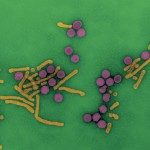Link to Pubmed [PMID] – 16164038
Immunobiology 2005;210(5):305-19
To improve the immunogenicity of epitopes derived from Gag proteins of simian immunodeficiency virus (SIV) and from the envelope (Env) protein of human immunodeficiency virus type 1 (HIV-1), we have designed hybrid DNA vaccines by inserting sequences encoding antigenic domains of SIV and HIV-1 into the hepatitis B virus envelope gene. This gene encodes the hepatitis B surface antigen (HBsAg) capable of spontaneous assembly into virus-like particles that were used here as carrier. Injections of hybrid vectors encoding B-cell epitopes from the gp41 and the gp120 envelope proteins of HIV-1 induced specific humoral responses in BALB/c mice. Furthermore, high frequencies of IFN-gamma-secreting CD8+ T cells specific for various antigenic determinants of SIV-Gag were observed after intramuscular injections of hybrid DNA vectors in BALB/c mice. Genetic immunization of HLA-A2.1-transgenic mice with HIV-Env/HBsAg-encoding DNA generated a strong CTL response and IFN-gamma-secreting CD8+ T lymphocytes specific for HIV-1 envelope-derived peptide. H-2d-restricted HBs-specific T-cell responses dominated over SIV-Gag responses in BALB/c mice whereas HLA-A2-restricted HIV-Env response was enhanced after fusion with HBsAg. These data demonstrate that different B and T-cell epitopes of vaccine-relevant viral antigens can be expressed in vivo as fusion proteins with HBsAg but that the optimal immunogenicity may differ strikingly between individual epitopes.

